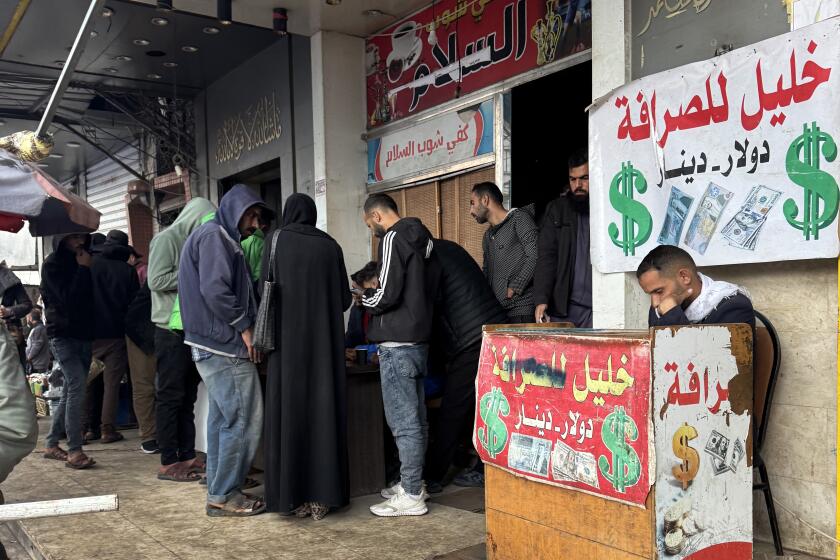Russia, Turkey expand military operations in Syria during Trump’s transition to power
- Share via
Reporting from Washington — U .S. intelligence officials expect Turkey and Russia to expand military operations in Syria over the next two months as President-elect Donald Trump’s transition team takes over and President Obama exits the White House.
The Obama administration has stood back as Turkish forces have pushed deeper into northern Syria and as Russia has escalated airstrikes on eastern Aleppo this week, pummeling the city with cruise missiles and fighter jets launched from its aircraft carrier in the Mediterranean.
A shake-up this week among Trump’s national security team has further emboldened Turkey and Russia in Syria, according to a U.S. intelligence official who spoke on condition of anonymity to discuss internal assessments.
The official said Ankara and Moscow are taking advantage of confusing diplomatic signals from Trump’s team about future U.S. policy in Syria.
“They will do what they can in the next two months,” said the official. “The expectation is they will put pressure on” to take more territory.
Both countries were “in a wait and see mode” before the election, the official said, adding that Russian and Turkish diplomats and intelligence officials were watching see how U.S. strategy in Syria might change after election day.
Both apparently see opportunities now that Trump has won.
In the past week, Russia and its ally Syrian President Bashar Assad have stepped up their attacks on rebel forces in Aleppo.
After a three-week lull in air attacks, Assad’s forces spent the last three days dropping barrel bombs and other munitions on Aleppo’s hospitals, blood banks and other facilities, according to human rights groups, while Russia launched air attacks from the sea.
U.S. intelligence officials expect Russia’s escalation in bombings to continue, James R. Clapper told lawmakers Thursday during a House Intelligence Committee hearing, and that will hurt opposition fighters’ “morale and willingness to fight.”
The Russian airstrikes support Assad’s efforts to defeat the rebels, Clapper said, and allows Assad to resist negotiating an end to a conflict that began in 2011 and has taken an estimated 400,000 lives.
Russia is “increasingly putting more pressure on oppositionists in Aleppo, indiscriminately bombing women, children, hospitals, this sort of thing,” Clapper said.
Trump has vowed to extend a hand to Moscow to see if U.S. and Russian authorities could work together more to resolve the crisis.
Trump spoke via telephone on Monday with Russian President Vladimir Putin, a conversation that the Kremlin said centered on their common resolve to fight “international terrorism and extremism.”
Turkish air and ground forces, joined by Syrian rebel fighters, are near the Islamic State-held town of Al Bab, which is 25 miles from the Turkish border. They will try to recapture the city without support from the U.S.-led coalition.
“This is something that [Turkey] decided to do independently,” Col. John Dorrian, spokesman for U.S. forces in Iraq, told reporters Wednesday via teleconference.
Turkey’s push is seen as a move to create a buffer zone between their border and Syrian Kurdish fighters who are aligned with Turkey’s Kurdistan Workers’ Party, or PKK. The group has waged an insurgency in Turkey for decades and is viewed by the Ankara government as a terrorist force.
Retired Lt. Gen. Michael Flynn, a contender to be Trump’s national security advisor, has been a staunch backer of Turkish President Recep Tayyip Erdogan’s government.
The Obama administration expressed concern after an attempted armed coup in July led to a harsh government crackdown on supposed opposition members. Thousands of Turkish politicians, military officers, journalists and others were fired or jailed.
“Both Turkey and Russia are posturing for position on the Syria chessboard,” said Nicholas A. Heras, a Middle East researcher at the Center for a New American Security, a think tank in Washington.
Heras said Turkey’s offensive in northern Syria is intended to prevent Kurdish militias in the east and the west from joining forces and creating a band of Kurdish held territory from Iraq to the Mediterranean. It also will make it harder for Assad to reconquer the border area.
In his first remarks since the U.S. election, Assad told Portugal’s public broadcaster this week that Trump would be “a natural ally, together with the Russians, Iranians and many other countries.”
Anthony Cordesman, a former State and Defense department official now at the nonpartisan Center for Strategic and International Studies in Washington, said Trump has not offered specifics on his plans for Syria, and the statements he has made have been contradictory.
“He needs to define his policies toward Syria early on because other nations, like Russia and Turkey, have clear interests,” he said. “They will continue to push the limits until they are told there are consequences.”
Trump admitted in a radio interview last December that he had a conflict of interest in dealing with Turkey because he has property there.
“I have a little conflict of interest, because I have a major, major building in Istanbul,” Trump said. “It’s called Trump Towers. Two towers, instead of one. Not the usual one, it’s two. And I’ve gotten to know Turkey very well.”
Twitter: @wjhenn
More to Read
Sign up for Essential California
The most important California stories and recommendations in your inbox every morning.
You may occasionally receive promotional content from the Los Angeles Times.











